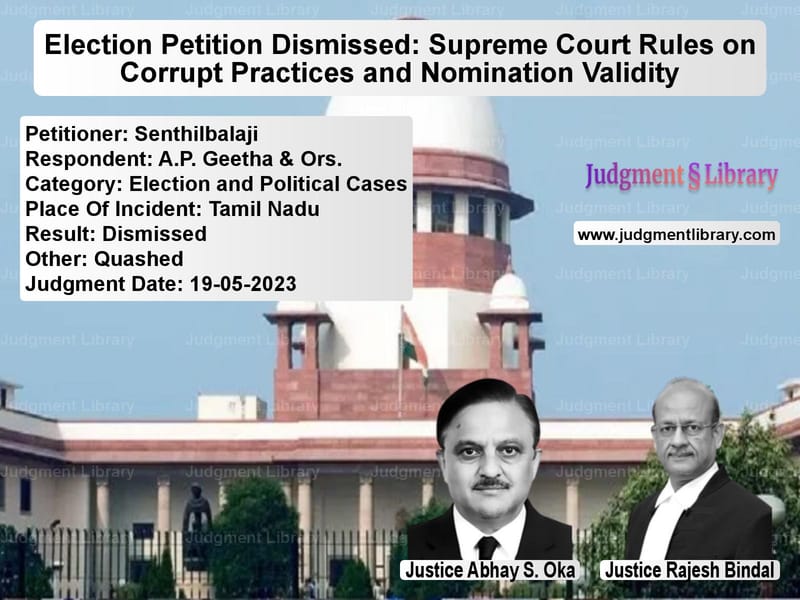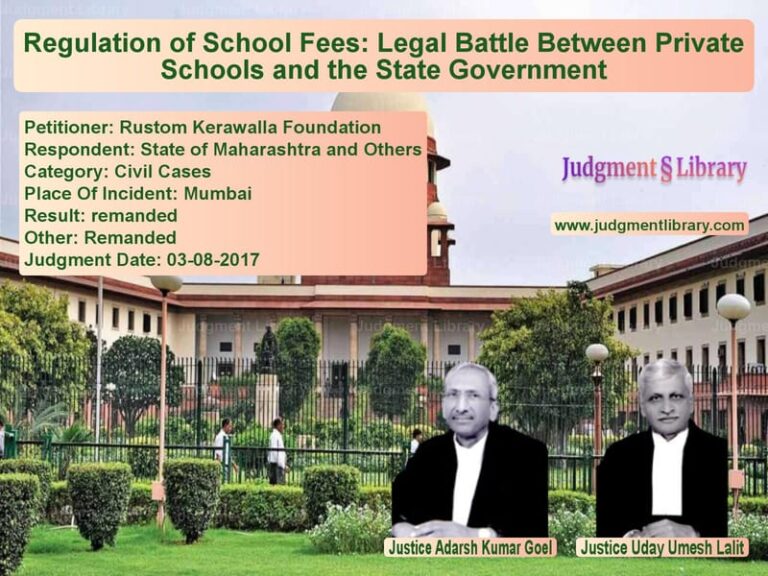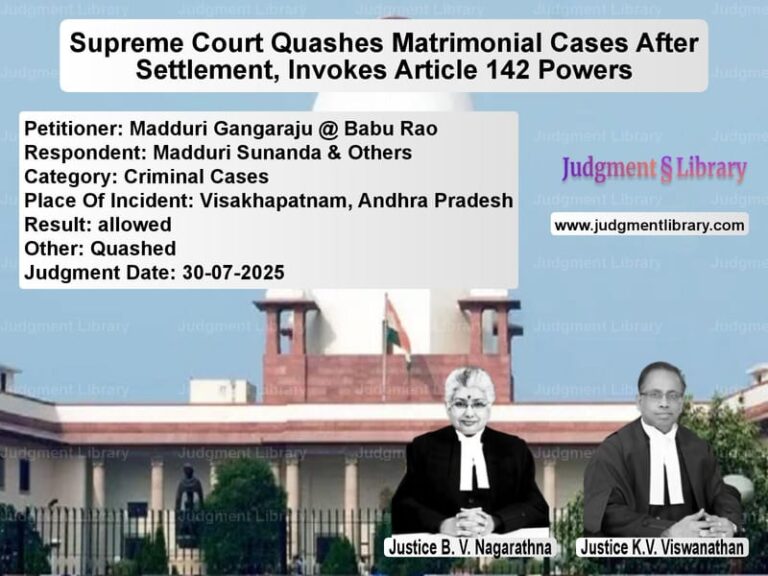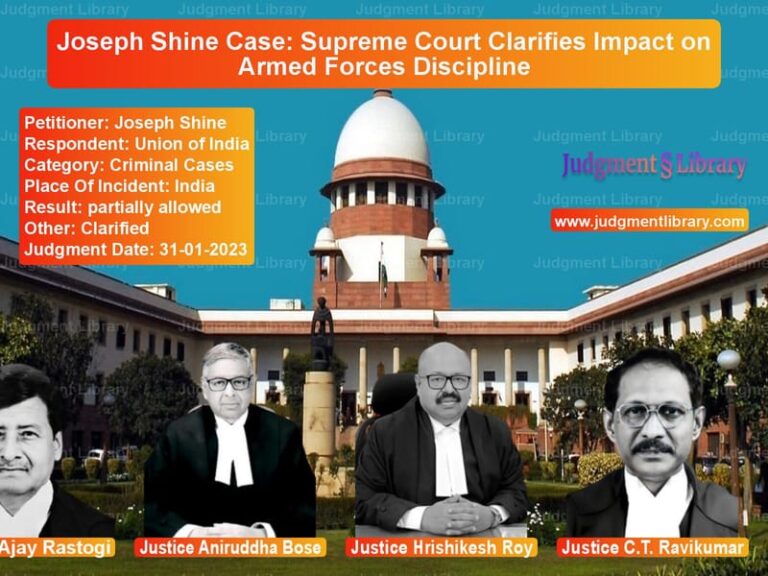Election Petition Dismissed: Supreme Court Rules on Corrupt Practices and Nomination Validity
The case of Senthilbalaji v. A.P. Geetha & Ors. deals with an election petition challenging the validity of the election of the appellant under the Representation of the People Act, 1951. The petition alleged corrupt practices and improper acceptance of the nomination papers. The Supreme Court was called upon to determine whether the petition met the legal requirements under Section 83 of the Act, which mandates material facts and particulars to support allegations of corrupt practice.
This case highlights the procedural and substantive legal requirements for filing an election petition and the importance of adhering to statutory mandates when challenging an election.
Background of the Case
The election in question was for the 134 – Aravakurichi Assembly Constituency. The polling was held on November 19, 2016, and the results were declared on November 22, 2016. The appellant, Senthilbalaji, secured 88,068 votes, while the second-place candidate received 64,407 votes. The first respondent (A.P. Geetha) polled only 82 votes and subsequently challenged the election.
The election petition filed before the Madras High Court was based on two key grounds:
- The improper acceptance of the nomination papers of the appellant and the second-place candidate.
- Allegations of corrupt practices, including bribery and misuse of government vehicles for campaigning.
The appellant sought the rejection of the election petition, arguing that it lacked material particulars and did not disclose a valid cause of action. However, the High Court dismissed this request, leading to an appeal before the Supreme Court.
Petitioner’s Arguments
The appellant, represented by Senior Counsel Ranjith Kumar, raised the following key arguments:
- The election petition failed to meet the requirements of Section 83(1) of the Representation of the People Act, 1951, which mandates that a petition contain material facts and full particulars of any corrupt practice alleged.
- The allegations in the petition were vague and did not specify the date, place, or individuals involved in the alleged corrupt practices.
- The High Court erred by directing the election petitioner to file additional documents instead of dismissing the petition.
- The election petition failed to specify any statutory provision that mandated the disclosure of the Election Commission’s previous findings by the candidates.
- The petition should be dismissed as it failed to provide a valid cause of action.
Respondent’s Arguments
The first respondent, represented by Advocate Balaji Srinivasan, countered with the following arguments:
- The election petition contained sufficient material facts regarding corrupt practices.
- Copies of emails, photographs, and video footage were submitted to the Election Commission as evidence of electoral misconduct.
- Even if certain particulars were missing, the petitioner could provide additional details at a later stage.
- Courts should not adopt a hypertechnical approach in election petitions, as they serve the greater purpose of ensuring fair elections.
Supreme Court Judgment
The case was heard by Justice Abhay S. Oka and Justice Rajesh Bindal. The Supreme Court analyzed the requirements for an election petition and determined whether the High Court had erred in allowing the petition to proceed.
Read also: https://judgmentlibrary.com/supreme-court-upholds-open-ballot-system-in-rajya-sabha-elections/
1. Lack of Material Facts
The Supreme Court found that the election petition did not meet the legal standard under Section 83 of the Representation of the People Act, 1951. The judgment noted:
“When the allegation is of corrupt practice, the basic facts constituting corrupt practice must be pleaded in order to comply with Section 83(1). In this case, such concise facts are not at all pleaded.”
The Court observed that the petition merely referred to representations made to the Election Commission without providing specific instances of wrongdoing.
2. Improper Acceptance of Nomination
The Court ruled that the petitioner failed to establish how the acceptance of nomination papers violated any statutory provision:
“The first respondent has not pleaded that under a particular statutory provision, the appellant and 6th respondent were under an obligation to disclose the Election Commission’s findings.”
Since the petition did not cite any law that required such disclosure, this ground was deemed legally insufficient.
3. Quasi-Criminal Nature of Corrupt Practices
The Court emphasized that allegations of corrupt practices have serious consequences and should not be vague:
“Allegations of corrupt practice are in the nature of criminal charges. It is necessary that there should be no vagueness in the allegations so that the returned candidate may know the case he has to meet.”
The Court held that a lack of specific details in the petition made it impossible for the appellant to defend himself properly.
4. High Court’s Error in Directing Additional Evidence
The Supreme Court criticized the High Court for instructing the election petitioner to file additional documents:
“It was for the first respondent to seek permission to produce the documents. The first respondent never sought such permission.”
The Court ruled that an election petition must stand on its initial pleadings, and additional evidence cannot be introduced to cure its defects.
Final Verdict
The Supreme Court allowed the appeal and dismissed the election petition, making the following key findings:
- The election petition did not disclose material facts to support the allegation of corrupt practices.
- The claim of improper acceptance of nomination was not based on any statutory provision.
- The High Court erred by allowing additional evidence instead of rejecting the petition.
As a result, the election petition was dismissed, bringing the legal challenge to an end.
Conclusion
This ruling reinforces the principle that election petitions must strictly comply with statutory requirements. Allegations of corrupt practices must be specific, well-documented, and legally sound. The Supreme Court’s decision ensures that election challenges are based on concrete legal grounds rather than vague or unsupported allegations.
Petitioner Name: Senthilbalaji.Respondent Name: A.P. Geetha & Ors..Judgment By: Justice Abhay S. Oka, Justice Rajesh Bindal.Place Of Incident: Tamil Nadu.Judgment Date: 19-05-2023.
Don’t miss out on the full details! Download the complete judgment in PDF format below and gain valuable insights instantly!
Download Judgment: senthilbalaji-vs-a.p.-geetha-&-ors.-supreme-court-of-india-judgment-dated-19-05-2023.pdf
Directly Download Judgment: Directly download this Judgment
See all petitions in Fundamental Rights
See all petitions in Public Interest Litigation
See all petitions in Judgment by Abhay S. Oka
See all petitions in Judgment by Rajesh Bindal
See all petitions in dismissed
See all petitions in Quashed
See all petitions in supreme court of India judgments May 2023
See all petitions in 2023 judgments
See all posts in Election and Political Cases Category
See all allowed petitions in Election and Political Cases Category
See all Dismissed petitions in Election and Political Cases Category
See all partially allowed petitions in Election and Political Cases Category







